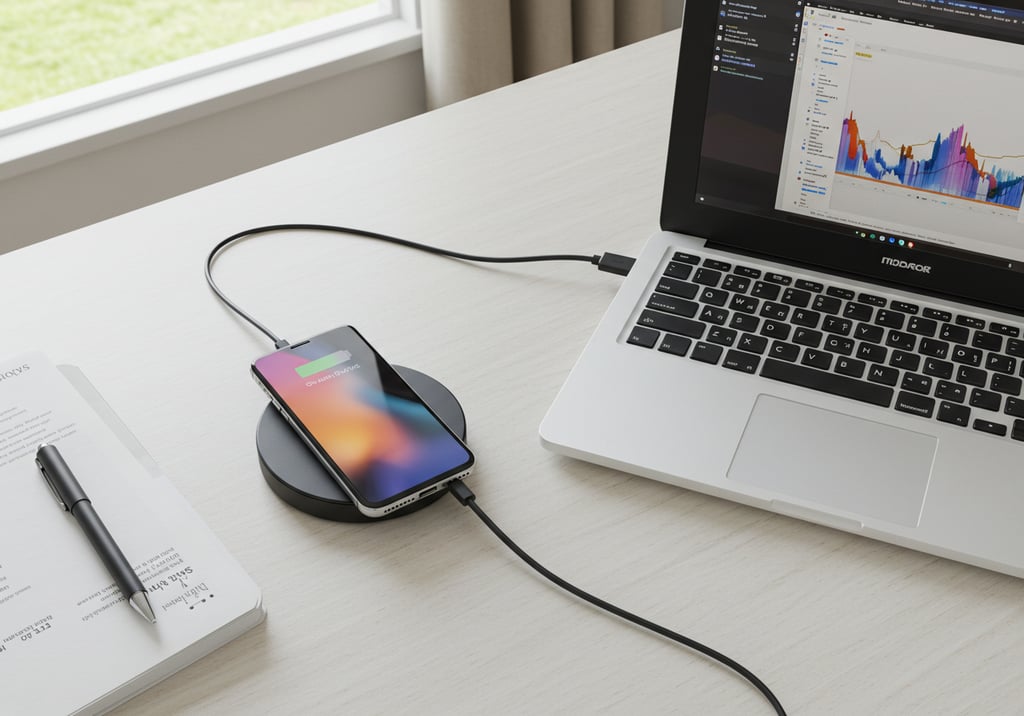How to Handle Technical Glitches During Remote Interviews Like a Pro
Discover proven strategies to confidently manage technical difficulties during virtual interviews. This comprehensive guide covers prevention techniques for common remote interview problems, effective troubleshooting methods, and professional communication tactics that transform technical challenges into opportunities to showcase your adaptability. Learn how to create an optimal interview environment, implement backup plans, and make a lasting positive impression on potential employers—even when technology fails. Includes expert tips for pre-interview preparation and post-interview follow-up to maximize your chances of landing your dream job.
J Matthew
5/15/20259 min read
How to Handle Technical Glitches During Remote Interviews Like a Pro
In today's digital-first job market, remote interviews have become the norm rather than the exception. While they offer convenience and flexibility, they also introduce a unique set of challenges—particularly when it comes to technology. According to recent statistics, over 92% of job seekers report experiencing interview anxiety, and technical issues during virtual interviews only compound this stress. However, with proper preparation and the right mindset, you can transform these potential obstacles into opportunities to showcase your problem-solving skills and adaptability.
The difference between a candidate who crumbles under technical pressure and one who handles it gracefully can significantly impact hiring decisions. Employers aren't just evaluating your answers; they're observing how you navigate unexpected challenges—a valuable skill in any workplace environment.


Common Technical Issues During Remote Interviews and Prevention Strategies
No matter how prepared you are, technical glitches can occur during even the most important interviews. Being aware of common issues can help you prevent them or address them swiftly when they arise.
The most frequent technical problems during virtual interviews include unstable internet connections, audio/video malfunctions, software compatibility issues, and unexpected background disruptions. Each of these challenges requires different prevention strategies and troubleshooting approaches.
Internet connectivity problems top the list of remote interview challenges. A dropped connection or laggy video can disrupt your flow and create awkward pauses that impact the interviewer's perception. To prevent this, test your internet speed before the interview using services like Speedtest.net, position yourself close to your router, or better yet, use a wired ethernet connection for maximum stability.
Preparing Your Audio and Video Setup
Poor audio quality can make communication difficult, while subpar video presentation can create a negative first impression. Audio problems during interviews often result from incorrect microphone settings, background noise, or hardware issues.
Before your interview, test your microphone and speakers through your computer's sound settings and the specific platform you'll be using. Consider using a dedicated headset with a built-in microphone rather than relying on your computer's hardware. Record a short test video to ensure your voice comes through clearly without echo or distortion.
Optimizing Your Software Environment
Software compatibility issues can cause unexpected glitches when you least need them. Different platforms have different requirements, and outdated applications may not function properly during your interview.
Make sure to:
Download the required platform (Zoom, Microsoft Teams, Google Meet, etc.) at least 24 hours before the interview
Install all recent updates
Create an account and test signing in
Familiarize yourself with the platform's features like screen sharing, chat functions, and mute controls
Close unnecessary applications on your device to free up processing power


Crafting a Professional Remote Interview Environment
Your interview environment significantly impacts both technical performance and professional impression. Remote interview environments should be carefully planned to minimize potential distractions and technical complications, including selecting appropriate attire that works well on camera.
Create a dedicated space where you'll have:
Good lighting (positioned in front of you, not behind)
A neutral, professional background
Minimal environmental noise
Limited potential for interruptions
A cluttered or distracting background forces interviewers to divide their attention, while poor lighting can strain both the video quality and the interviewer's eyes. Position your camera at eye level, ensure your face is well-lit, and remove any potential distractions from your background.


Step-by-Step Response Plan for Technical Difficulties
Despite your best preparations, technical issues may still arise. Having a technical difficulty response plan allows you to handle problems professionally without losing your composure—a quality employers highly value.
Immediate Actions When Technical Problems Arise
When you encounter a technical issue during your interview, follow these steps:
Acknowledge the problem calmly and professionally
Briefly explain the situation without over-apologizing
Request a moment to troubleshoot if appropriate
Implement your solution quickly
If the issue persists, offer alternatives
For example, if your video freezes, you might say: "I apologize, it seems my video connection is unstable. May I try reconnecting quickly?" This demonstrates your problem-solving ability and communication skills under pressure.
Backup Solutions to Keep Interviews on Track
Backup plans are essential for maintaining professionalism when primary systems fail. Having alternatives ready shows foresight and dedication to completing the interview successfully.
Always have these backup options prepared:
Alternative device (tablet or smartphone) charged and ready
Phone number of the interviewer or recruiter
Different internet connection option (mobile hotspot)
Knowledge of how to dial in by phone to video platforms if video fails
Ability to quickly switch to a phone interview if necessary
Remember, how you handle technical difficulties speaks volumes about how you might handle workplace challenges. Maintaining composure and implementing solutions efficiently demonstrates valuable soft skills.


Communication Strategies During Technical Disruptions
Effective communication during technical difficulties can transform a potentially negative experience into a positive demonstration of your professional capabilities. Your verbal and non-verbal communication during these moments is crucial.
When faced with technical challenges during your interview, maintain clear communication by:
Speaking clearly and a bit more slowly than usual to compensate for any audio issues
Letting the interviewer know if you missed part of a question due to audio glitches
Using concise language to explain technical issues and your resolution approach
Demonstrating patience and a positive attitude throughout
Remember that non-verbal communication remains important even during technical difficulties, as certain mistakes can undermine your professionalism despite your technical problem-solving skills. Maintain good posture, appropriate facial expressions, and professional body language throughout the troubleshooting process.
Professional Language for Addressing Technical Issues
The way you describe and address technical problems reflects your communication style in workplace settings. Use professional language that acknowledges the issue without making excuses or placing blame.
Instead of saying "My internet is terrible today," try "It appears my connection is experiencing some instability. I've prepared for this possibility and can switch to my backup device if needed."
Learning from Technical Challenges
Every interview technical difficulty presents an opportunity to demonstrate resilience and adaptability—qualities highly valued in today's workplace. How you respond to these challenges can actually enhance your candidacy rather than detract from it.
After experiencing technical issues during an interview:
Reflect on what happened and how you handled it
Identify improvements for future interviews
Incorporate the experience into your follow-up communication
In your post-interview thank-you email, you might briefly acknowledge any significant technical challenges while emphasizing your appreciation for the interviewer's patience and reiterating your interest in the position. This shows professionalism and turns a potential negative into a positive.
Leveraging Technology Challenges to Showcase Your Skills
While technical difficulties are rarely welcome, they provide an authentic opportunity to demonstrate workplace skills that might otherwise remain theoretical in an interview setting.
When you navigate technical challenges effectively, you demonstrate:
Problem-solving abilities
Adaptability and flexibility
Communication under pressure
Preparation and foresight
Technical troubleshooting capabilities
These are precisely the qualities many employers seek, particularly in roles that require independent work, remote collaboration, or technical aptitude.
How Employers Evaluate Your Response to Technical Issues
Hiring managers understand that technical problems occur, and they're often more interested in your response than the issue itself. Employer evaluation of how you handle difficulties provides valuable insight into your potential workplace performance.
Employers typically assess:
Your initial reaction (composure vs. frustration)
The efficiency of your troubleshooting
Your communication throughout the process
Your ability to continue the interview effectively
The professionalism of your overall approach
Remember that employers aren't expecting perfection—they're looking for professionals who can navigate challenges effectively and maintain productivity despite obstacles.
Using Technical Challenges in Your Interview Responses
If asked about problem-solving or adaptability during your interview, you can reference your real-time handling of any technical issues as a concrete example. This transforms the challenge into a demonstration of your capabilities.
For example, if asked about how you handle unexpected problems, you might say:
"Actually, today's technical difficulty provided a real-time example. When faced with challenges, I first identify the issue, communicate clearly about the situation, and implement the most efficient solution while maintaining professionalism."


Mobile Optimization and Device Considerations
In today's multi-device world, (mobile device preparedness) for interviews has become increasingly important. Your primary interview setup might involve a laptop or desktop, but having mobile options ready can save an interview when major technical issues arise.
Consider these mobile optimization strategies:
Install interview platforms on your smartphone or tablet as backup
Test video and audio quality on these devices beforehand
Have a phone stand or stable position identified
Ensure your mobile devices are fully charged
Know how to quickly transfer to a mobile interview if needed
The shift to a mobile device mid-interview isn't ideal, but handling it smoothly demonstrates your adaptability and commitment to completing the interview successfully.
Cross-Platform Compatibility Planning
Different interview platforms function differently across devices. (Cross-platform knowledge) helps you transition between devices if necessary without losing significant interview time.
Before your interview:
Test how the interview platform works on all your devices
Know the login process for each
Understand the different features and limitations on each device
Practice quickly switching between devices
This preparation ensures that a technical failure on one device doesn't end your interview opportunity.
Post-Interview Communication After Technical Issues
Your follow-up communication after an interview with technical difficulties is an opportunity to demonstrate professionalism and reinforce your candidacy. Post-interview communication should acknowledge significant issues while maintaining a positive focus on the conversation and your qualifications.
In your thank-you email:
Express appreciation for the interviewer's time and flexibility
Briefly acknowledge any major technical disruptions without dwelling on them
Reiterate key points you wanted to emphasize during the interview
Restate your enthusiasm for the position and company
Offer to provide any additional information they might need
This approach shows maturity and professionalism while ensuring technical problems don't become the focus of your candidacy.
Measuring Success: Learning from Each Interview Experience
Each virtual interview, even those with technical challenges, provides valuable experience that improves your performance in future interviews. Interview success measurement should include not just the outcome but also your technical preparation and problem-solving effectiveness.
After each interview, evaluate:
What technical elements worked well
Which issues arose and how you handled them
How you might improve your setup or responses
What you learned about the interview platform
How you can better prepare for future interviews
This ongoing improvement process demonstrates the growth mindset employers value in potential team members.


Implementing Your Technical Interview Strategy
While there's no guaranteed way to prevent all technical difficulties during remote interviews, implementing the strategies outlined in this article will significantly reduce their likelihood and severity. More importantly, your preparation and response to any issues that do arise can transform potential obstacles into opportunities to showcase your professional qualities.
Remember that how you handle unexpected challenges in an interview often provides recruiters with more insight into your work style than your prepared responses. By approaching technical difficulties with calm, professional problem-solving, you demonstrate precisely the adaptability and resilience employers seek in today's rapidly evolving workplace.
Your interview success depends not on perfect technology, but on thorough preparation, professional communication, and the ability to navigate challenges effectively. By implementing these strategies, you'll be well-equipped to handle technical glitches during remote interviews like the true professional you are.
Ready to master the remote interview process and ensure technical glitches don't stand between you and your dream job? Sign up for a mock interview with our experienced specialists to practice handling technical challenges and see the data-proven results of professional interview preparation. Our professionals will help you prepare for every aspect of remote interviewing, from technical setup to seamless problem-solving strategies.
Sources:
HogoNext. (2024). "How to Deal with Technical Difficulties During a Virtual Interview." https://hogonext.com/how-to-deal-with-technical-difficulties-during-a-virtual-interview/
LinkedIn Advice. (2023). "How do you handle technical glitches or interruptions during a virtual interview without losing your cool?" https://www.linkedin.com/advice/3/how-do-you-handle-technical-glitches-interruptions-1f
RippleMatch. (2024). "9 Ways to Minimize Technical Difficulties During a Video Interview." https://ripplematch.com/career-advice/9-ways-to-minimize-technical-difficulties-during-a-video-interview-337b2918
Remote.com. (2025). "Remote interview tips: 5 tactics to ace your job interview." https://remote.com/blog/remote-job-interview-tips
FlexJobs. (2024). "20 Tips for Acing Your Remote Job Interview in 2025." https://www.flexjobs.com/blog/post/tips-preparing-for-your-remote-job-interview-v2
Helios HR. (n.d.). "5 Most Common Problems When Assessing Candidates in Remote Interviews." https://www.helioshr.com/blog/5-most-common-problems-when-assessing-candidates-in-remote-interviews
Mock Interview Specialist
"Tailored mock interviews for career growth success."
Want to receive helpful interview tips?
DBA Mock Interview Specialist - 2025 - All Rights Reserved




